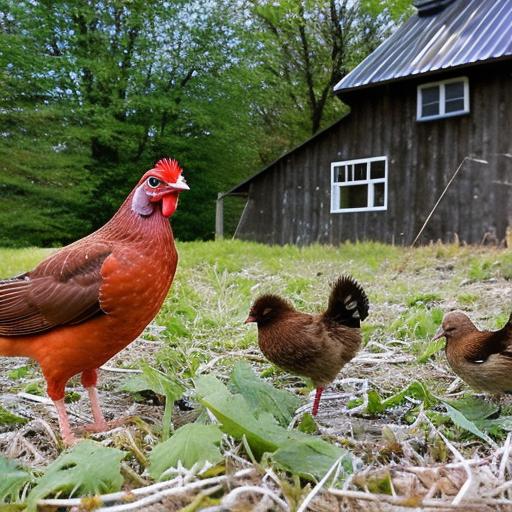Keeping chickens on Long Island has become increasingly popular in recent years. Many people are drawn to the idea of having their own fresh eggs and the joy of raising their own flock. I have personally experienced the benefits of keeping chickens on Long Island and can attest to the satisfaction it brings. In this article, we will explore the legal requirements, choosing the right breed, housing and space requirements, feeding and caring for chickens in Long Island’s climate, health and disease prevention, benefits and challenges of keeping chickens on Long Island, tips for successful chicken keeping, and resources available for chicken keepers on Long Island.
Key Takeaways
- Keeping chickens on Long Island is a popular hobby that provides fresh eggs and a connection to nature.
- Legal requirements for keeping chickens on Long Island include obtaining a permit and following zoning regulations.
- Choosing the right breed of chicken for Long Island depends on factors such as climate, egg production, and temperament.
- Housing and space requirements for chickens on Long Island include providing a secure coop and run with adequate ventilation and protection from predators.
- Feeding and caring for chickens in Long Island’s climate involves providing a balanced diet, fresh water, and protection from extreme temperatures and weather conditions.
Legal Requirements
Before embarking on your chicken-keeping journey, it is important to familiarize yourself with the legal requirements in your area. Zoning laws and permits vary from town to town on Long Island, so it is crucial to check with your local municipality to ensure that you are in compliance. Some towns may require a permit or license to keep chickens, while others may have specific restrictions on the number of chickens allowed or coop and run regulations.
Choosing the Right Breed
When selecting a breed for your flock, it is important to consider Long Island’s climate. The winters can be harsh, so choosing cold-hardy breeds is essential. Some popular cold-hardy breeds include Rhode Island Reds, Plymouth Rocks, and Wyandottes. These breeds are known for their ability to withstand cold temperatures and continue laying eggs throughout the winter months.
If you are looking for a dual-purpose breed that can provide both meat and eggs, consider breeds such as Sussex or Orpingtons. These breeds are known for their large size and excellent egg-laying capabilities.
If your main goal is egg production, there are several breeds that excel in this area. Breeds such as Leghorns, Australorps, and Sex Links are known for their high egg production rates.
Housing and Space Requirements
Providing adequate housing and space for your chickens is crucial for their health and well-being. The size and design of the coop will depend on the number of chickens you plan to keep. As a general rule of thumb, each chicken should have at least 4 square feet of indoor space in the coop. The coop should also have proper ventilation to prevent moisture buildup and ensure good air quality.
In addition to the coop, chickens also need access to a run where they can stretch their legs and forage for bugs and plants. The run should be securely fenced to protect the chickens from predators. It is recommended to provide at least 10 square feet of outdoor space per chicken.
Predator-proofing is essential when keeping chickens on Long Island. Common predators include raccoons, foxes, and hawks. Ensure that the coop and run are secure with sturdy fencing, locks, and wire mesh to prevent any unwanted visitors from harming your flock.
Feeding and Caring for Chickens in Long Island’s Climate
Feeding and caring for chickens in Long Island’s climate requires some special considerations. In the winter months, when the ground is covered in snow, it may be necessary to provide additional feed to supplement their diet. This can include grains, vegetables, and high-protein treats such as mealworms.
In the summer months, chickens may require additional water to stay hydrated. It is important to provide fresh, clean water at all times. Chickens also enjoy cooling off in the shade or dust bathing to keep themselves cool.
Egg collection should be done regularly to prevent eggs from freezing in the winter or becoming too hot in the summer. Collecting eggs daily also helps to ensure that they are fresh and clean.
Health and Disease Prevention

Keeping your flock healthy is essential for their overall well-being. Common diseases in chickens include respiratory infections, parasites, and egg-related issues. It is important to monitor your chickens for any signs of illness and seek veterinary care if necessary.
Vaccinations are available for certain diseases, such as Marek’s disease and Newcastle disease. Consult with a veterinarian specializing in poultry care to determine which vaccinations are recommended for your flock.
Biosecurity measures should also be implemented to prevent the spread of diseases. This includes keeping a clean coop and run, quarantining new birds before introducing them to the flock, and practicing good hygiene when handling chickens.
Benefits of Keeping Chickens on Long Island
There are numerous benefits to keeping chickens on Long Island. One of the most obvious benefits is having access to fresh eggs. There is nothing quite like collecting eggs from your own backyard and knowing exactly where they came from.
Chickens also provide natural pest control by eating insects, slugs, and other garden pests. This can help reduce the need for chemical pesticides in your garden.
Additionally, chicken manure is an excellent source of fertilizer for gardens. It is rich in nutrients and can be composted to improve soil quality and promote healthy plant growth.
Challenges of Keeping Chickens on Long Island
While there are many benefits to keeping chickens on Long Island, there are also some challenges to be aware of. Predators can pose a significant threat to your flock, especially at night when they are most vulnerable. It is important to take precautions to protect your chickens from predators by ensuring that the coop and run are secure.
Extreme weather conditions can also be a challenge for chicken keepers on Long Island. The winters can be harsh, with freezing temperatures and heavy snowfall. It is important to provide adequate shelter and insulation in the coop to keep the chickens warm during these cold months.
Noise complaints from neighbors can also be a concern when keeping chickens on Long Island. Roosters, in particular, can be noisy and may not be allowed in some residential areas. It is important to check with your local municipality regarding any noise restrictions or regulations.
Tips for Successful Chicken Keeping on Long Island
To ensure a successful chicken-keeping experience on Long Island, it is important to do your research and be prepared. Familiarize yourself with the local laws and regulations, and ensure that you have the necessary permits or licenses.
Building a strong and secure coop and run is crucial for the safety of your flock. Take the time to design and construct a sturdy structure that can withstand the elements and keep predators out.
Regular cleaning and maintenance of the coop and run is essential for the health of your chickens. This includes removing droppings, replacing bedding, and checking for any signs of damage or wear.
Resources for Chicken Keepers on Long Island
There are several resources available for chicken keepers on Long Island. Local feed stores often carry a variety of chicken feed, supplies, and equipment. They can also provide valuable advice and guidance on chicken care.
Joining chicken keeping groups and forums can also be a great way to connect with other chicken keepers in your area. These groups often share tips, advice, and resources, making it easier to navigate the world of chicken keeping.
Finally, finding a veterinarian who specializes in poultry care is important for the health and well-being of your flock. They can provide vaccinations, diagnose and treat illnesses, and offer guidance on proper care and nutrition.
Keeping chickens on Long Island can be a rewarding experience. From fresh eggs to natural pest control and fertilizer for gardens, there are numerous benefits to be enjoyed. However, it is important to be aware of the legal requirements, choose the right breed, provide adequate housing and space, feed and care for chickens in Long Island’s climate, prioritize health and disease prevention, understand the challenges involved, and follow tips for successful chicken keeping. With proper research, preparation, and resources, anyone can successfully keep chickens on Long Island.
If you’re considering keeping chickens on Long Island, you’ll want to make sure you have the right setup to provide them with a safe and comfortable environment. One important aspect is having a well-designed chicken coop and run. Poultry Wizard offers a helpful article on chicken coop and run plans that can guide you in creating the perfect space for your feathered friends. Additionally, if you’re worried about keeping your chickens warm during the colder months, Poultry Wizard also provides information on heaters for chicken coops. Check out their article on choosing the right heater to ensure your chickens stay cozy and healthy all year round.
FAQs
What are the laws regarding keeping chickens on Long Island?
The laws regarding keeping chickens on Long Island vary by town and village. Some areas allow chickens with certain restrictions, while others prohibit them altogether. It is important to check with your local government before keeping chickens.
What are the benefits of keeping chickens on Long Island?
Keeping chickens on Long Island can provide a source of fresh eggs, fertilizer for gardens, and entertainment for families. Chickens can also help control pests in the yard and provide a sustainable food source.
What are the challenges of keeping chickens on Long Island?
Some of the challenges of keeping chickens on Long Island include predators such as raccoons and hawks, zoning restrictions, and noise complaints from neighbors. It is important to properly secure the coop and run to protect the chickens from predators and to be respectful of neighbors.
What do I need to keep chickens on Long Island?
To keep chickens on Long Island, you will need a secure coop and run, feed and water containers, bedding material, and appropriate feed for the chickens. You may also need to obtain a permit or register your chickens with your local government.
What breeds of chickens are best for Long Island?
Some of the best breeds of chickens for Long Island include Rhode Island Reds, Plymouth Rocks, and Leghorns. These breeds are hardy and can tolerate the climate and weather conditions on Long Island.
Meet Walter, the feathered-friend fanatic of Florida! Nestled in the sunshine state, Walter struts through life with his feathered companions, clucking his way to happiness. With a coop that’s fancier than a five-star hotel, he’s the Don Juan of the chicken world. When he’s not teaching his hens to do the cha-cha, you’ll find him in a heated debate with his prized rooster, Sir Clucks-a-Lot. Walter’s poultry passion is no yolk; he’s the sunny-side-up guy you never knew you needed in your flock of friends!







